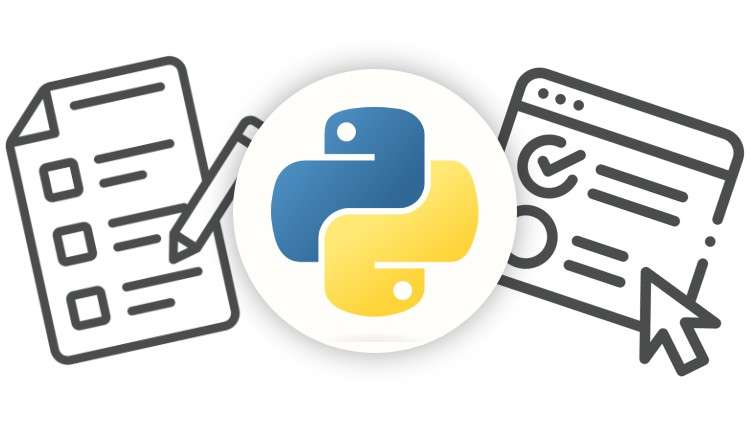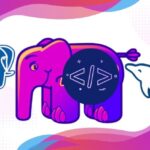![Python Developer Interview Questions Practice Test [2023]](https://studybullet.com/wp-content/uploads/2023/12/5658002_99f4.jpg)
400+ Python Developer Interview Questions and Solutions MCQ Follow Check Quiz with Detailed Explanations. [Nov. 2023]
What you’ll be taught
Deep Understanding of Python Fundamentals and Superior Ideas
Proficiency in Information Buildings, Algorithms, and Drawback-Fixing
Sensible Abilities in Internet Growth and RESTful API Design
Foundational Data in Information Science, Machine Studying, and Visualization
Description
Python Developer Interview Questions Follow Check [Updated 2023]
Dive into the world of Python programming with our complete MCQ quiz observe course, designed to take you from Python fundamentals to superior matters, together with internet improvement, knowledge science, and machine studying. Whether or not you’re a newbie desirous to be taught Python or an skilled developer trying to sharpen your abilities, this course affords a novel and interactive strategy to grasp Python ideas via participating multiple-choice questions.
What You’ll Be taught:
Part 1: Python Fundamentals
- Grasp Variables and Information Sorts: Perceive and manipulate primary knowledge sorts with ease.
- Conquer Management Buildings: Acquire experience in if statements, loops, and exception dealing with for sturdy code.
- Features and Modules: Be taught to write down reusable features and set up your code effectively.
Part 2: Superior Python Ideas
- Object-Oriented Programming: Grasp the nuances of courses, objects, inheritance, and polymorphism.
- Decorators and Turbines: Uncover the facility of decorators and mills in Python.
- Metaclasses: Unravel the superior idea of metaclasses and their sensible functions.
Part 3: Information Buildings and Algorithms
- Manipulate Primary Information Buildings: Grasp lists, tuples, units, dictionaries, and strings.
- Superior Information Buildings: Perceive the implementation and use of stacks, queues, linked lists, and timber.
- Algorithm Design and Evaluation: Develop and analyze environment friendly algorithms for real-world issues.
Part 4: Internet Growth with Python
- Internet Apps with Flask/Django: Create dynamic internet functions utilizing Flask or Django.
- RESTful API Growth: Design and implement scalable RESTful APIs.
- Entrance-end Integration: Seamlessly combine Python back-end with front-end applied sciences.
Part 5: Information Science and Machine Studying
- Information Dealing with with NumPy/Pandas: Manipulate and analyze knowledge proficiently.
- Machine Studying with Scikit-learn/TensorFlow/PyTorch: Construct and consider fashions utilizing main ML frameworks.
- Information Visualization: Craft compelling visualizations with Matplotlib and Seaborn.
Part 6: Testing and Debugging
- Unit Testing: Create efficient unit checks with unittest or pytest.
- Debugging Methods: Be taught superior debugging strategies for environment friendly problem-solving.
- Code Profiling and Optimization: Optimize code for peak efficiency.
We Replace Questions Recurrently: Our dedication to your studying journey means we repeatedly replace our query financial institution to replicate the newest traits, updates, and finest practices in Python programming. This ensures you’re at all times studying probably the most present and related elements of Python.
Examples of the Kinds of Questions You’ll Encounter:
- State of affairs-Based mostly Questions: Deal with real-world issues and apply Python ideas in sensible situations.
- Code Evaluation: Consider and interpret Python code snippets to check your understanding of syntax and performance.
- Error Identification: Spot and proper errors in Python code, enhancing your debugging abilities.
- Conceptual Questions: Dive deep into Python’s theoretical elements, together with algorithmic design and OOP rules.
- Output Prediction: Check your capacity to foretell the output of given Python code, an important ability for any developer.
10 Ceaselessly Requested Questions (FAQs):
- Q: What’s polymorphism in Python?
- A: Polymorphism permits strategies to have the identical identify however behave in another way based mostly on the item they’re referred to as on.
- Q: How do decorators improve features in Python?
- A: Decorators permit for the modification or enhancement of features with out altering their precise code.
- Q: What’s the distinction between lists and tuples in Python?
- A: Lists are mutable (could be modified), whereas tuples are immutable (can’t be modified).
- Q: Are you able to clarify the idea of a RESTful API?
- A: RESTful APIs are internet companies that use HTTP requests to carry out CRUD operations (Create, Learn, Replace, Delete) on sources represented in codecs like JSON.
- Q: What’s the objective of unit testing in Python?
- A: Unit testing includes testing particular person parts of a program to make sure every half features accurately.
- Q: How does Python implement inheritance?
- A: Inheritance in Python permits one class (little one class) to inherit attributes and strategies from one other class (mother or father class).
- Q: What are mills in Python, and the way are they helpful?
- A: Turbines are a sort of iterable that generate gadgets on the fly, which is extra memory-efficient than storing an entire checklist.
- Q: What’s a DataFrame in Pandas?
- A: A DataFrame is a two-dimensional, size-mutable, and doubtlessly heterogeneous tabular knowledge construction in Pandas.
- Q: How is TensorFlow completely different from Scikit-learn in machine studying?
- A: TensorFlow is extra centered on deep studying algorithms, whereas Scikit-learn supplies a variety of conventional machine studying algorithms.
- Q: What’s the significance of metaclasses in Python?
- A: Metaclasses in Python are a category of a category that defines how a category behaves. They’re superior options used to regulate class creation.
Enroll now to embark on this thrilling journey to Python mastery via an progressive and interactive studying expertise!
Content material
The publish Python Developer Interview Questions Follow Check appeared first on destinforeverything.com/cms.
Please Wait 10 Sec After Clicking the "Enroll For Free" button.








